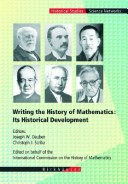The notion of mathematical structure is among the most pervasive ones in twentieth century mathematics. "Modern algebra and the rise of mathematical structures" describes two stages in the historical development of this notion: first it traces its rise in the context of algebra from the mid-nineteenth century to its consolidation by 1930 aimed at elucidating, from a purely mathematical perspective, the precise meaning of this idea. Part 1 discusses the process whereby the aims and scope of the discipline of algebra were deeply transformed, turning it into that branch of mathematics dealing with a new kind of mathematical entities: the "algebraic structures". The transition from the classical, nineteenth-century, image of the discipline to the new one is examined by focusing mainly on developments within the theory of ideals, from Richard Dedekind to Emmy Noether, and culminating with the publication in 1930 of Bartel L. van de Waerden's "Moderne algebra". Following its enormous success in algebra, the structural approach was widely adopted in other mathematical domains since the 1930s.
But, what is a mathematical structure and what is the place of this notion within the whole fabric of mathematics? Part 2 describes the historical roots, the early stages and the interconnections between three attempts to address these questions from a purely formal, mathematical perspectives: Oystein Ore's lattice-theoretical theory of structures, Nicolas Bourbaki's theory of structures, and the theory of categories and functors. The book is intended for historians of mathematics and mathematicians interested in the development of algebra and in the history of twentieth-century mathematics. It will also be read with interest by philosophers and historians of science concerned with the role of heuristic and contextual factors in the development of scientific ideas.
- ISBN10 3764353112
- ISBN13 9783764353117
- Publish Date February 1996 (first published 1 January 1996)
- Publish Status Active
- Out of Print 12 September 2013
- Publish Country CH
- Imprint Birkhauser Verlag AG
- Format Hardcover
- Pages 467
- Language English
